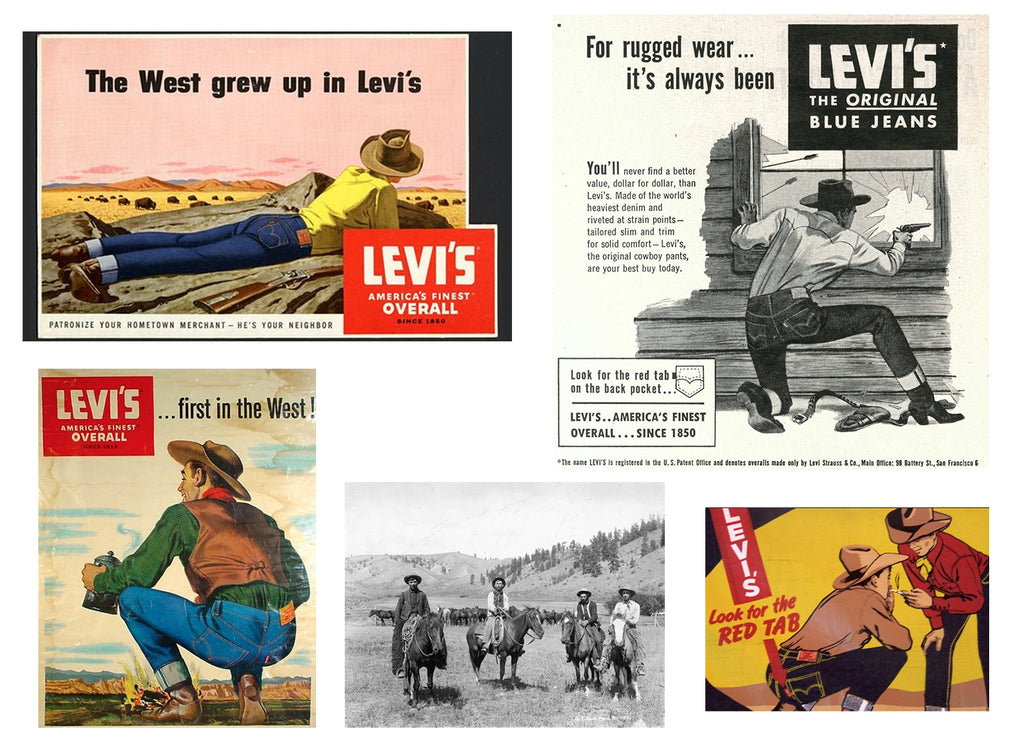LEVI’S: Print the Legend
After the Gold Rush, but at the Right Place and Time
By Jim Kempton
Levi’s 501 jeans, the shared uniform of cowboys, bikers and surfers alike, are iconic. The rugged, blue-denim, five-pocket, ultra-utilitarian workwear pant, with its orange stitching, copper-riveted stress points and metal button fly-front are famous worldwide. The printed leather label on the right rear waistband—depicting two horses being goaded in a futile attempt to tear apart a pair—are as effective branding in the 21st century as they were when Levi Strauss & Company was granted its patent on their design and construction. Levi’s are certainly legendary, but how much of what people think they know is actually fact?

In John Ford’s classic movie, “The Man Who Shot Liberty Valance” there’s a line that sums up some of this romance. “This is the West, sir, "a newspaper reporter explains. “When the legend becomes fact, print the legend.”
OK, so let’s take a look. Legend number one: Levi’s jeans were the favored work pants of gold rush miners because they were so tough. Fact is, Levi Strauss likely did head West, to San Francisco in 1853, to open up a West Coast version of his family’s New York dry goods business—selling textiles, some clothing, handkerchiefs, etc.—because the Gold Rush has spurred business opportunity in the city. But young Levi himself wasn’t a tailor and didn’t begin making jeans until 1872, by which time the Gold Rush was pretty much over.
Legend number two: Levi’s were the favored work pants of cowboys in the golden age of the cattle drives. Nah, not likely, although they may well have been the favored workwear of the Hollywood movie crews (including directors and wardrobe dept.) who were making westerns in the 1940’s, ‘50s and ‘60s. In fact the real “wild west” was rather short, 1856 to 1886, after which railroads brought cattle to markets and the cowboy era was done and dusted. What’s more, real cowboys were more likely to wear castoff woollen pants from Civil War uniforms, tucked into their boots and covered with leather chaps to save their legs from being shredded by sagebrush, cactus and other thorny bushes.
Legend number three: The term “jeans” is derived from canvas sailcloth originating in the Italian port of Genoa. Nope, Levi’s were never made out of sailcloth. OK, legend three-and-a-half: Jeans were made of denim from the French town of Nimes (so, from Nimes, de Nimes, equals “denim.” No, sorry; yet again a factual corruption. The textile “serge de Nimes” may have been sometimes dyed blue, but it was traditionally made of wool and silk, not cotton twill.
Legend number four: Levi Strauss was a genius clothing designer whose creation has stood the test of 200 years. Well, he was clearly a good businessman, but the real genius of Levis 501s was more likely Jacob Davis, a tailor from Reno, Nevada. In a letter to Strauss, his textile supplier, Davis disclosed the unique way he made pants using stress-point rivets to make them last longer. Davis wanted to patent this new idea, he wrote, but needed a business partner with money to get the idea off the ground. Strauss saw the potential. The patent was granted to Jacob Davis and Levi Strauss & Company on May 20, 1873. And the legendary blue jeans were born.
Fact is, the real history of Levi’s largely went up in smoke in 1906 when the great San Francisco earthquake started a huge fire that burned down Levi’s HQ. All of the company’s archives were destroyed, leaving an almost clean slate for a cultural legend to be re-born.

In his early 1960s book “Modern Surfing Around The World,” John Severson, the founder of Surfer magazine wrote: “The uniform of the surfer is … Levi’s and a white Tee-shirt, preferably with an advertisement on the back.”
When the legend becomes fact, print the legend.
